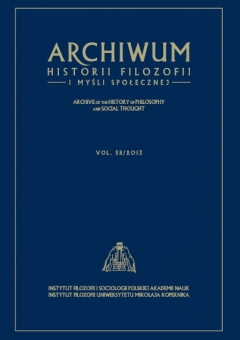Destrukcja lub synteza. O dwóch metodach interpretacji filozofii Williama Jamesa
Destruction or Synthesis. On Two Methods of Interpretation of William James’ Philosophy
Author(s): Zbigniew AmbrożewiczSubject(s): Philosophy
Published by: Instytut Filozofii i Socjologii Polskiej Akademii Nauk
Keywords: James; analysis; synthesis; romanticism; utilitarianism; Swedenborg; the reflex arc; prometheism; mysticism;
Summary/Abstract: The paper describes two styles of interpretation of William James’s philosophy. The first one, defined by me as “analytical-disintegrating”, presents the philosophy of James as a set of mutually exclusive or, at least, a very weakly coherent elements creating a schizophrenic unity. The second one, “synthetic-integrating”, aims at a consistent vision, trying to skip its vagueness or use it for a synthesizing comprehension. In conclusion, I present a third, intermediate path which does not refrain from revealing some of Jamesian inconsistencies, but, at the same time, aims at separating them from some cohesive motives to build so called center of James’s vision. As examples of these tendencies I chose some works of American scholars (J. S. Bixler, W.J. Gavin, R. M. Gale, J.O. Pawelski, Ch. H. Seigfried), Belgian (R. Barthelot) and Finnish (A. Varila). As a heuristic model and the epitome of these two methods I present two characters of Witold Gombrowicz’s novel Ferdydurke, the master of Synthesis, Filidor and his great opponent, a brilliant analist, anty-Filidor.
Journal: Archiwum Historii Filozofii i Myśli Społecznej
- Issue Year: 58/2013
- Issue No: 58
- Page Range: 229-252
- Page Count: 24
- Language: Polish

